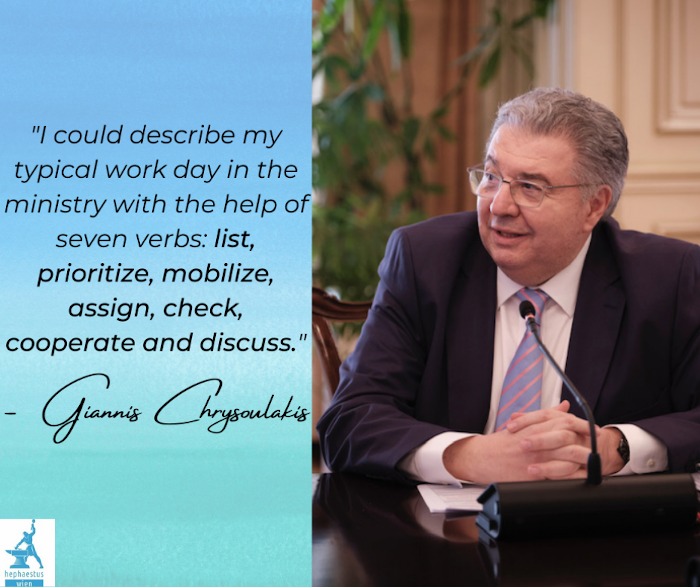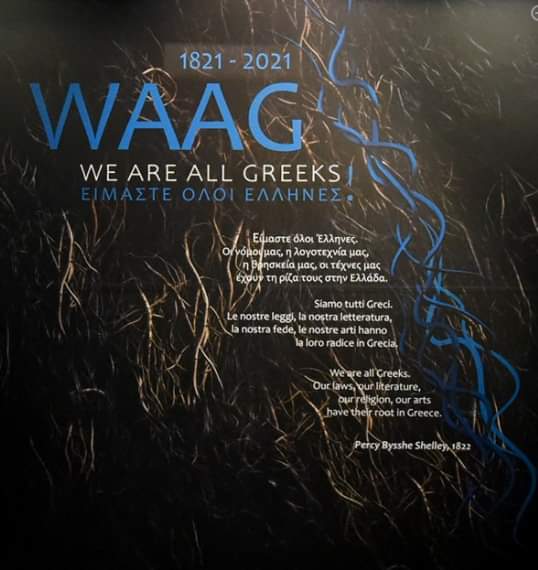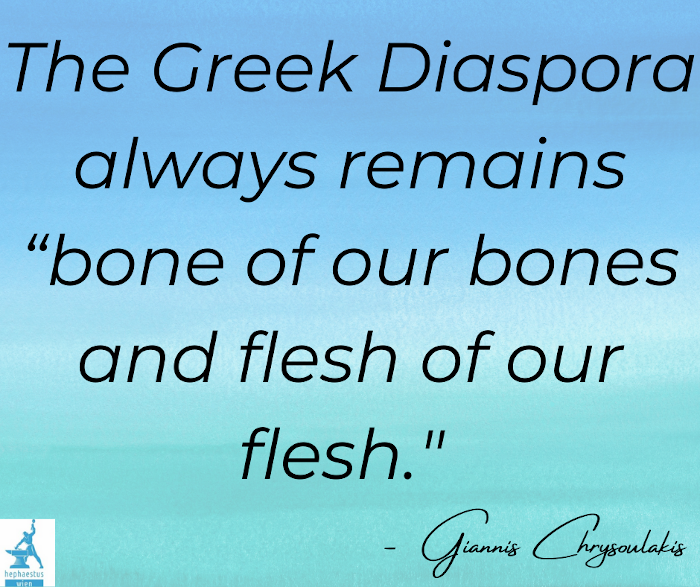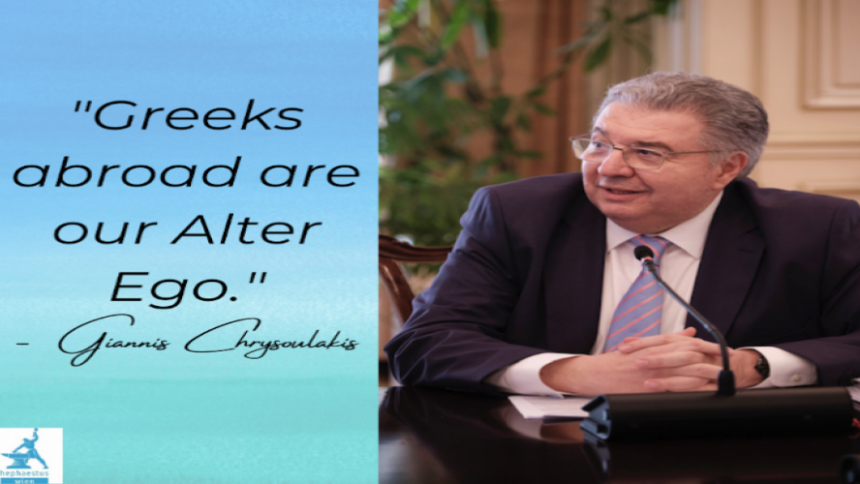Iphigenia Moraitini Patriarchea
- You are known for working both late and early. What does the day of J. Chrysoulakis look like? And how would you change it if you could?
I have never asked myself this question so far. But if I had to do it now, I could describe my typical work day in the ministry with the help of seven verbs: list, prioritize, mobilize, assign, check, cooperate and discuss. I start by listing my tasks and I organize them in order of priority. Then I mobilize all the members of my team and assign them the short and long-term projects we have to conduct. Of course, I regularly check progress in order to be able to troubleshoot any issues, and I cooperate and discuss strategy and goals with the heads of unit for which I am responsible.
Now, apart the work inside the office and the chasing of progress on our commitments, I often have meetings with people from the minister’s office as well as with other officials, and some other times I head over to Parliament if there is a legislation regarding my Deputy Minister’s portfolio or I am invited to attend the Parliamentary Special Permanent Committee on Greeks Abroad.

But, the most important part of my daily work concerns the meetings I have with lots of people, such as prominent Greeks living abroad, foreign diplomats in Greece, mayors and counterparts from other ministries, to discuss prospects and plans, to inaugurate or improve cooperation in the fields of Greek Diaspora and Public Diplomacy.
Equally important is my participation, on behalf of the General Secretariat, in many conferences, seminars and other events, digital for the moment due to the pandemic, where I have the opportunity to be among our brothers of Diaspora, listen to their points of view and the problems they are facing, and share new ideas on how to strengthen their relations with the homeland.
Now, as regards your question whether I could change something in my job, I’m afraid I have not a prepared answer. However, I could say that I would like to increase the best part of my job and the best part of my job is seeing our efforts yield good results in all fields and especially in the field of the creation of an overall positive brand image for our country.
- In the days of the Greek Revolution, whose anniversary we celebrate this year, the diaspora were the people who advocated for Greece abroad. In the days of WW2, which we commemorated a few weeks ago, the Greek diaspora’s profile was directly elevated by Greece’s wartime heroism. The relationship between Greece and its diaspora has had fluxes and refluxes through history; the recent financial crisis deserves its own chapter. What, would you say, does the Greek diaspora mean to Greece in the 21st century?
I’m glad you brought up this issue. Greeks abroad are our “Alter Ego.” They constitute a major force in the dissemination of Greek values and culture, with an active role in the promotion and explanation of our views on national interest issues. They are a channel of friendship and solidarity with their host countries. Their deep and enduring relationship with the homeland has been amply reflected in this year’s events celebrating the Bicentennial of the Greek Revolution, all over the world. Despite the fluxes and refluxes that you mention, the Greek Diaspora always remains “bone of our bones and flesh of our flesh.”
For this reason, we are working so that the Greeks abroad become a cell for the reconstruction of Greece and actively participate in what is happening and concerns the homeland both inside and outside the borders.
- We have all read your CV in the press releases announcing your position. But which of your achievements are you proudest of?
The smooth merging of two important sectors of the Ministry of Foreign Affairs, Public Diplomacy and the Greeks Abroad, is truly a great achievement. I have been working hard for this, to prove that these two areas do not contradict each other, but are complementary and serve the same purpose, which is none other than shaping and communicating the country’s image in the international public opinion. To this purpose, the support from our brothers of the Diaspora is decisive; the Greeks living and working abroad know better than any other else how to cultivate relationships and build trust with other people in their hosting countries. In this sense, Greeks abroad are a precious “lever” for our country’s public diplomacy and, as Archimedes, the famous Greek mathematician, physicist and engineer, used to say centuries ago, “give me a place to stand, with a lever, I will move the whole world.”
- Every state has services, activities and programs that really should be better known. What would you like people to be more aware of?
The list is so long that I cannot be exhaustive. Let me therefore talk about only three areas of action that are being implemented around the world.
First of all, let us mention the actions we have planned, and those that Greek communities abroad have proposed, for the celebration of the Bicentennial of the Greek War of Independence. These actions are being in progress and we are all proud of their successful implementation. 2021 is a milestone year for all Hellenism and the image of Greece internationally. It is a unique opportunity to communicate all over the world the image of a modern state with all its achievements during the two centuries of its independence. To this end, we are providing the Diaspora, as well as our Diplomatic Authorities in all the world, with a series of ready-to-use digitalized documents, testimonies and archival material which we obtained through our cooperation with Piraeus Bank in synergy with the National and Kapodistrian University of Athens, the National Historical Museum, Greek National Opera, and the General State Archives. The provision of these products will continue throughout the year and will be enriched with more digitalized material in collaboration with the Hellenic Army Academy, the War Museum, the Athens Concert Hall and other institutions.

Another significant action, which is the result of long efforts, is about keeping the Greek language alive and spread the Greek culture among the new generation of our expatriates. In this field, we have been actively involved in the creation and promotion of the online learning platform “StaEllinika.com”, a very useful free tool that the Greek Diaspora, as well as all those interested in learning Greek, can use to learn our language, history and culture. This was made possible thanks to a fertile cooperation with the Ministry of Education and Religious Affairs and the Stavros Niarchos Foundation Center for Hellenic Studies at Simon Fraser University. The platform was fully funded by the Stavros Niarchos Foundation, first launched in April 2020 and officially presented in October 2020. There are currently more than 30,000 registered users from 118 countries. The platform has been introduced in all Greek schools in North America and will soon be available to schools in the United Kingdom and Australia. Soon, it will be available in various other languages, as in Spanish and Portuguese, both of them imminent and expected with great interest.
Now in the field of education, another program we are implementing together with the Ministry of Education and Religious Affairs is the “Study In Greece” campaign, which offers to both Greek expatriates and foreign students the possibility to come to Greece and carry out undergraduate and postgraduate studies, in English or Greek and with low tuition fees, in many Greek Public Universities. This campaign promotes Greece as an international educational destination and enhances the extroversion of the Greek Higher Institutes. The promotion of Greek higher education worldwide and the attraction of foreign students is of great value in terms of public diplomacy, because it forges strong and long-lasting relations with the country of study, and offers foreign students knowledge and rich experiences that in the long term easily transform into a positive stance and support for the country that hosted them as well as into economic activity and any kind of cooperation with the people of this country.
- If Greece is truly the “birthplace of Western civilization”, a great idea that is defined by common cultural mores, then it follows that everyone who espouses these mores is more or less a “Greek”, but not a Greek in the sense of nationality. How therefore, do you in your professional capacity define the “Greek diaspora”?
Let me start by quoting Percy Shelley’s well-known verse “we are all Greeks, our laws, our literature, our religion, our arts have their root in Greece”, from his poem “Hellas”, a poem that significantly contributed to the acknowledgment of Greece as the cradle of Western civilization and to the birth of the Philhellenism movement. This poem continues to inspire modern writers, poets and artists, as we can see if we visit the new periodical exhibition WAAG (We Are All Greeks!), organized under the auspices of our General Secretariat and hosted by the Museum of Byzantine Culture in Thessaloniki.

Today, modern friends of Greece have the same love and admiration for our country as the philhellenes of the 19th century and a pilgrimage to the Acropolis causes to them the same feelings as those it caused to Lord Byron 200 years ago. That is why the Greek state honors modern philhellenes, as it recently did with the three American archaeologists, Dr. Jack Davis, Dr. Sharon Stocker and Dr. Charles Williams, for their excavation work, their archeological studies, but also their connection with modern Greece.
That is why many of our programs are jointly addressed to the Greek Diaspora and the Philhellenes, such as the digital platform “StaEllinika.com” or the campaign “Study In Greece“, that I mentioned in my previous answer. At the same time, we support a large number of conferences, exhibitions and other actions inspired by historical or modern Philhellenism.
- Everyone has a bad day, or week, or year. Easy tasks and tough ones. What would you say is the biggest challenge you have faced in this position?
Promoting the country’s image is a big challenge by itself, since it requires a meticulous work, both in Greece and abroad through our network of Public Diplomacy Offices within our Diplomatic Missions. We have to pursue synergies, combine communication narratives from leading policy areas, such as culture or tourism, literature and the arts, economy and foreign investment, and develop communication strategies on how best to convey Greece’s positions on domestic and international issues.
- Adding on to the previous, sometimes, no matter how well we want to succeed, we don’t. What would you say is your biggest regret?
I cannot remember such a case even when I have to recall emergencies or other difficult situations. Not even when we have to combat disinformation and protect public opinion in Greece and abroad from fake news, which is one of our most difficult tasks. Even then, we try to build our communication strategy around reality, not by creating a false appearance of the country or by distorting facts. Admittedly, it’s not always easy, but here are our role and efforts to shape a reliable reputation for the country. On the other hand, we provide continuing education to our executives through seminars, conferences and other study courses, as we recently did in collaboration with the University of Oxford on digital diplomacy issues. And we do it rather well, according to the IFG-Monocle Soft Power Survey 2020 which ranked Greece, for the first time, in the top ten “soft power” countries in the world.

- Adding on to the previous, what comes next for you and the GG that we, the diaspora, should be on the lookout for?
Further strengthening relations with the Diaspora is our priority, and to this end we cooperate with international networks involving prominent Greeks abroad, for example medical or academic associations, the Parliamentary Special Permanent Committee on Greeks Abroad, the European Network of Greeks Elected in Local Administration, as well as the World Hellenic Inter -parliamentary Association. Our goal is to provide MPs and other elected officials of Greek origin with all the information they may need to support our country’s options, as they did last year to protest against the decision which turned the universal Hagia Sophia monument into a mosque.
One of our initiatives in this context is to promote a network of excellence for scientists who live or want to live in Greece and produce work of high international standards. At the same time, we are drafting plans that will bring the Diaspora closer to their homeland, such as the strategy of second residence acquisition in Greece, especially in villages, islands and the mountainous parts of the country.
We are also expecting a lot of progress in the digitalization of our consular services which began with the “myConsulLive” system, an online portal designed to enable expatriate Greeks to conduct their transactions with the consular authorities through video calls, and last but not least, we look forward to returning to normalcy so that the General Secretariat can resume many of its activities that were suspended due to the pandemic, such as summer schools and language and civilization courses for the Greek Diaspora’s new generation.
- We have to ask about the pandemic (of course). In your view, has the pandemic changed the diaspora?
Not only has the Diaspora remained unchanged during the period of the Covid-19 pandemic, but also its connection to the homeland has become even stronger. Let’s see the USA for example, where all the Greek-American associations have continued to alert local policy makers to illegal actions against Greece along the Evros river border and over the migrant crisis in the Aegean. It seems that the domestic pressures of the pandemic were not able to deflect our Greek expatriates concerns from preserving their homeland’s security.
Apart that, what is impressive about the Greek Diaspora all this time is the incredible exposure of Greek expatriate scientists in the homeland’s media. The growing complexity of the pandemic’s management, combined with the ever growing interest of acquiring more and more knowledge on Covid-19, has drawn into Greece’s public sphere a great number of Greek scientists with the relevant expertise from diverse disciplines. This kind of publicity has consolidated the identity of the Greek scientist living abroad as a prominent public intellectual. Co-founder of Regeneron George Yancopoulos, CEO of Pfizer Albert Bourla, together with Professors Elias Mossialos, Manolis Dermitzakis or George Pavlakis, have acquired a high profile and become household names globally known. Due to the pandemic, the homeland’s Greeks rediscovered their expatriate brothers and once again felt proud of the recognized value of many of them.
Source: Hephaestuswien.com






